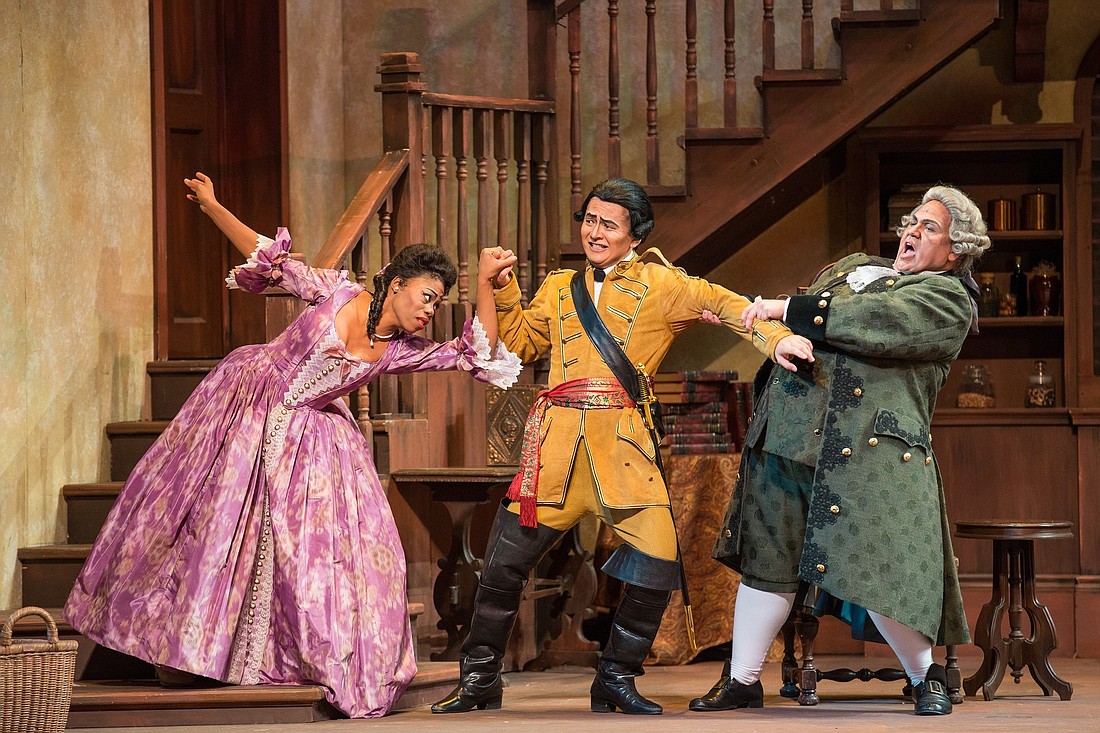- April 20, 2024
-
-
Loading

Loading

The roar of laughter and joy from the crowd at Saturday’s opening of Sarasota Opera’s production of Rossini’s “Il Barbiere di Siviglia” sounded more like a deliriously happy Broadway audience than a staid assemblage of operagoers. That was as it should have been and a fine tribute to one of the best showings of this well-loved staple we’ve seen in years.
William Gustafson’s staging was energetic, smart, sassy and stylistically spot-on with just enough shtick to keep smiles on our faces and guffaws gushing out, but never overshadowing the music or the composer’s intent. He had his cast on the move, doing those little things that make them individuals and characters, rather than cardboard singing sticks. This was his third, and finest, “Barber” with Sarasota Opera, and he seems to have grown into the work. He gives Rossini’s musical cues every bit of theatricality the composer called for.
His superb cast helped, starting with a Rosina, played by Chrystal E. Williams, who was so strong and so assured — vocally and dramatically — she pretty much stole the show.
Williams, a fourth-year resident artist at The Academy of Vocal Arts in Philadelphia, is a mezzo soprano who seems destined for great things. Although the bottom of her range is still a little raw, the timbre of her voice has an energy and brightness that carried her easily through the coloratura fanfare of “Una voce poco fa,” and everything else Rossini tossed in her path. That made her a spitfire Rosina with a twinkle in her eyes and the kind of sparkle her suitor, Count Almaviva (in multiple disguises), would pursue to the ends of Andalusia.
Hak Soo Kim, the Rosina-doting Count, is a glistening tenor who sings, delightfully, on the top of the pitch, with just enough “squillo” (penetrating resonance) to make every Rossini-style turn and trill sound just that much more exciting. His last-act aria, a piece that is usually cut because it is not only impossibly difficult to sing but also adds little to the storyline of the piece, was both a pleasure to hear and an amazing feat of vocal calisthenics worthy of the operatic Olympics.
Rossini, who was a little like the Stuart Woods of the 19th century opera world, not only turned out three or four massive operas a year, he also stole from himself and, in Almaviva’s final aria, we heard huge swaths of Cinderella’s “Non piu mesta,” which actually was written in 1817, the year after “The Barber of Seville.” (He also recycled Rosina’s famous “Una voce” from “Elisabetta, regina d’Inghilterra” an opera seria he’d written the year before. And even the famous overture to the “Barber” had been heard, not once, but twice, in varying forms as an overture, first in “Aureliano in Palmira” and then in “Elisabetta.” So, self-plagiarism was nothing new to Rossini.)
Back to the cast, Steven Condy’s Dr. Bartolo, Rosina’s guardian and suitor, made a believable person of this sometimes doddering but wily old man, singing with humor, warmth and style. Matthew Burns was a brilliantly duplicitous Basilio whose “La Calunnia” was biting and colorful. Berta, the old housekeeper, was portrayed by the lustrously voiced Studio Artist Alexandra Batsios, who may have sung like an angel but epitomized a tired old woman, world and bone weary.
Marco Nistico took on the galvanizing role of Figaro, the barber who orchestrates all the shenanigans that unfold in the course of the opera. While singing well — his famous “Largo” was fine but not mesmerizing — he was more careful with his music and acting, making his Figaro less than the superhuman, ingenious young man he’s meant to be. It may have been that his colleagues were stronger than he, but Nistico, who certainly did no wrong, was in a role that bears the title of the opera for good reason. Perhaps he’ll become the electrifying character called for, as the season continues.
Marcello Cormio, who led the splendid orchestra and vocal forces, was an assistant conductor with Sarasota Opera about four years ago. He had a lovely, light touch with the music, never overpowering the singers but always keeping the tempos brisk and stylistic. In fact, he brought out the ever-present champagne bubbles that make Rossini the sparkler of a composer he was. He and Gustafson seem to make an excellent pair, adding all the little details that make an opera come alive. This “Barber” was very much an ensemble piece with every note and character taking on an individuality that breathed freshness into an old friend. If you’ve seen this Rossini icon before, you’ll adore this one. If this is your first “Barber,” it will turn you into a full-fledged operavore.